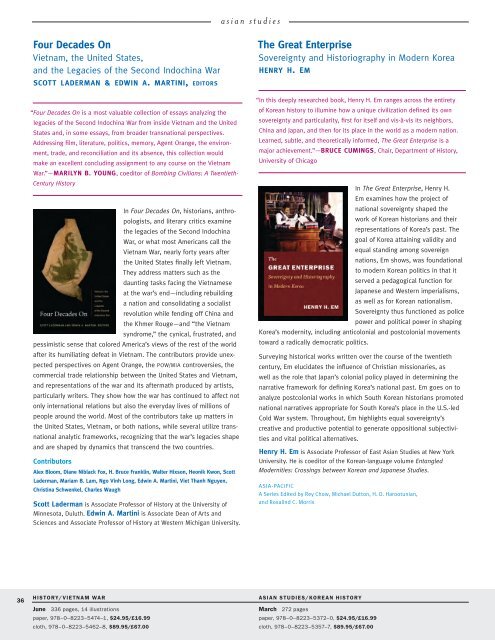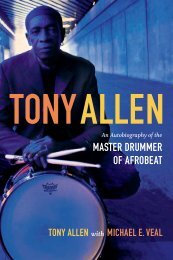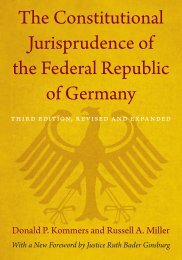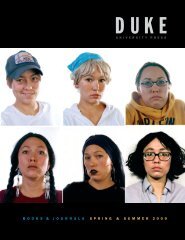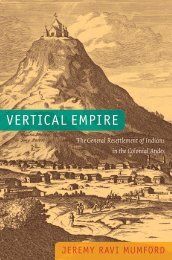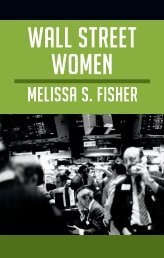Spring 2013 Catalog - Duke University Press
Spring 2013 Catalog - Duke University Press
Spring 2013 Catalog - Duke University Press
Create successful ePaper yourself
Turn your PDF publications into a flip-book with our unique Google optimized e-Paper software.
36<br />
Four Decades On<br />
Vietnam, the United States,<br />
and the Legacies of the Second Indochina War<br />
scott laderman & edwin a. martini, editors<br />
“Four Decades On is a most valuable collection of essays analyzing the<br />
legacies of the Second Indochina War from inside Vietnam and the United<br />
States and, in some essays, from broader transnational perspectives.<br />
Addressing film, literature, politics, memory, Agent Orange, the environ-<br />
ment, trade, and reconciliation and its absence, this collection would<br />
make an excellent concluding assignment to any course on the Vietnam<br />
War.”—MARILYN B. YOUNG, coeditor of Bombing Civilians: A Twentieth-<br />
Century History<br />
In Four Decades On, historians, anthropologists,<br />
and literary critics examine<br />
the legacies of the Second Indochina<br />
War, or what most Americans call the<br />
Vietnam War, nearly forty years after<br />
the United States finally left Vietnam.<br />
They address matters such as the<br />
daunting tasks facing the Vietnamese<br />
at the war’s end—including rebuilding<br />
a nation and consolidating a socialist<br />
revolution while fending off China and<br />
the Khmer Rouge—and “the Vietnam<br />
syndrome,” the cynical, frustrated, and<br />
pessimistic sense that colored America’s views of the rest of the world<br />
after its humiliating defeat in Vietnam. The contributors provide unexpected<br />
perspectives on Agent Orange, the POW/MIA controversies, the<br />
commercial trade relationship between the United States and Vietnam,<br />
and representations of the war and its aftermath produced by artists,<br />
particularly writers. They show how the war has continued to affect not<br />
only international relations but also the everyday lives of millions of<br />
people around the world. Most of the contributors take up matters in<br />
the United States, Vietnam, or both nations, while several utilize transnational<br />
analytic frameworks, recognizing that the war’s legacies shape<br />
and are shaped by dynamics that transcend the two countries.<br />
Contributors<br />
Alex Bloom, Diane Niblack Fox, H. Bruce Franklin, Walter Hixson, Heonik Kwon, Scott<br />
Laderman, Mariam B. Lam, Ngo Vinh Long, Edwin A. Martini, Viet Thanh Nguyen,<br />
Christina Schwenkel, Charles Waugh<br />
Scott Laderman is Associate Professor of History at the <strong>University</strong> of<br />
Minnesota, Duluth. Edwin A. Martini is Associate Dean of Arts and<br />
Sciences and Associate Professor of History at Western Michigan <strong>University</strong>.<br />
HISTORY/VIETNAM WAR<br />
June 336 pages, 14 illustrations<br />
paper, 978–0–8223–5474–1, $24.95/£16.99<br />
cloth, 978–0–8223–5462–8, $89.95/£67.00<br />
asian studies<br />
The Great Enterprise<br />
Sovereignty and Historiography in Modern Korea<br />
henry h. em<br />
“In this deeply researched book, Henry H. Em ranges across the entirety<br />
of Korean history to illumine how a unique civilization defined its own<br />
sovereignty and particularity, first for itself and vis-à-vis its neighbors,<br />
China and Japan, and then for its place in the world as a modern nation.<br />
Learned, subtle, and theoretically informed, The Great Enterprise is a<br />
major achievement.”—BRUCE CUMINGS, Chair, Department of History,<br />
<strong>University</strong> of Chicago<br />
In The Great Enterprise, Henry H.<br />
Em examines how the project of<br />
national sovereignty shaped the<br />
work of Korean historians and their<br />
representations of Korea’s past. The<br />
goal of Korea attaining validity and<br />
equal standing among sovereign<br />
nations, Em shows, was foundational<br />
to modern Korean politics in that it<br />
served a pedagogical function for<br />
Japanese and Western imperialisms,<br />
as well as for Korean nationalism.<br />
Sovereignty thus functioned as police<br />
power and political power in shaping<br />
Korea’s modernity, including anticolonial and postcolonial movements<br />
toward a radically democratic politics.<br />
Surveying historical works written over the course of the twentieth<br />
century, Em elucidates the influence of Christian missionaries, as<br />
well as the role that Japan’s colonial policy played in determining the<br />
narrative framework for defining Korea’s national past. Em goes on to<br />
analyze postcolonial works in which South Korean historians promoted<br />
national narratives appropriate for South Korea’s place in the U.S.-led<br />
Cold War system. Throughout, Em highlights equal sovereignty’s<br />
creative and productive potential to generate oppositional subjectivities<br />
and vital political alternatives.<br />
Henry H. Em is Associate Professor of East Asian Studies at New York<br />
<strong>University</strong>. He is coeditor of the Korean-language volume Entangled<br />
Modernities: Crossings between Korean and Japanese Studies.<br />
ASIA-PACIFIC<br />
A Series Edited by Rey Chow, Michael Dutton, H. D. Harootunian,<br />
and Rosalind C. Morris<br />
ASIAN STUDIES/KOREAN HISTORY<br />
March 272 pages<br />
paper, 978–0–8223–5372–0, $24.95/£16.99<br />
cloth, 978–0–8223–5357–7, $89.95/£67.00


